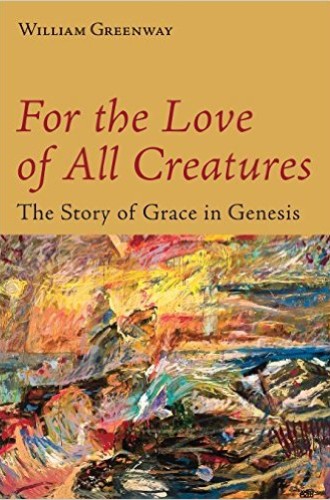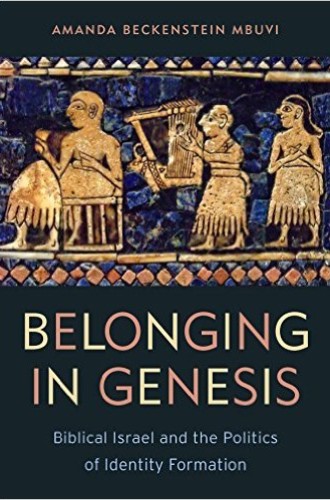The genesis of kinship
In 1967, Lynn White Jr. famously laid responsibility for the contemporary ecological crisis squarely at the feet of the Christian tradition. White argued that Christianity is the most anthropocentric religion the world has ever seen, because the Judeo-Christian creation story portrays all of nature as made solely for human benefit and rule.
In contending with this charge, Christians have returned to the text of Genesis to discover whether a more inclusive vision might be drawn from it. No less a figure than Pope Francis, in his 2015 encyclical on climate change and inequality, argued that, although the church has often read dominion to mean domination, the ancient stories of Genesis bear witness to a created world that is interconnected and has value in God’s eyes. Two recent books on Genesis add to the dialogue, offering provocative new interpretations of an ancient text.
Read our latest issue or browse back issues.
William Greenway challenges anthropocentric readings of the creation and flood narratives by reading the first nine chapters of Genesis “from an overtly creature-loving point of view.” He begins by setting Genesis alongside two alternative creation narratives, one ancient and one modern. Greenway exemplifies the modern, materialist account of creation (according to which there is only one “stuff”—matter, governed by physical laws) with Thomas Hobbes’s 17th-century work of political philosophy Leviathan. He also explores the ancient creation narrative that he claims is most directly in competition with Genesis, the Babylonian Enuma Elish.
Measuring these two alternative creation stories against one another, Greenway contends that the Babylonian account affirms the moral reality of goodness, which the materialist account cannot do; yet it still lacks the “vital depth” of Genesis. That vital depth goes beyond simply affirming a moral aspect to reality: it presents a God of grace, filled with love for all of creation. With such a God in mind, Greenway’s analysis finally turns to the text of Genesis itself.
This is also the point at which the reader begins to have doubts. Greenway’s interpretive fulcrum is Noah’s sacrifice upon exiting the ark (Gen. 8:20). According to Greenway, the story of Noah’s sacrifice (like the Hebrew Bible as a whole) both affirms and critiques the practice of animal sacrifice. Noah’s sacrifice represents not only a turning point in the narrative but a turning point in the compilation and redaction of the text itself, Greenway suggests. In this interpretation the flood story reveals a transformation in how God is experienced by the people shaped by the narrative.
However, Greenway’s prose often suggests that God himself is transformed by the events the story portrays. In the aftermath of the flood God looks upon the destruction he has wrought, sees (or smells) Noah’s sacrifice, and draws back from the shocking violence—the shocking violence of the sacrifice.
According to Greenway, the biblical editors resolve the dissonance between a God who brings the flood and a God who hates violent sacrifices by making the narrative portray a transformation in God himself. The analysis often seems forced, however, because of Greenway’s insistence on arguing more from claims about what the redactors intended to communicate than from the content of Genesis itself. The divine transformation Greenway claims to identify can only be found by reading between the lines of the biblical text, and the same God who purportedly eschews violent retribution not only never experiences any guilt over the violence of the flood but even goes on to rain down sulfur on a wicked city.
In the end, though, Greenway seems less concerned about the intricacies of textual redaction and interpretation—though those take up the bulk of the central three of the nine chapters—than to argue that the creation account reveals a God who loves all of creation. Where humans are to exercise dominion, says Greenway, they are to be guided by God’s love for all creatures and a recognition that creation ultimately belongs to God.
This position is one that Greenway shares with Pope Francis, and while he purports to find it in the flood narrative his most convincing arguments derive from his reading of the seven-day creation account. Here the reader’s doubts begin to recede—like the flood waters themselves—and those who seek a nonanthropocentric reading of Genesis will likely be more satisfied with Greenway’s use of the creation story than his use of the flood story.
Amanda Beckenstein Mbuvi challenges modern interpreters who read Genesis (at least in part) as the story of the origin of an ethnic group. Instead, says Mbuvi, Genesis subverts nationalistic and ethnic understandings of identity in favor of more fluid, contingent formulations grounded in theology and genealogy.
Modern readers of Genesis, Mbuvi argues, have tended to understand identity in terms of belonging to well-defined ethnic or nationalistic groupings. They’ve also tended to read that understanding back into a text that does not share—or support—such modern categories. Mbuvi calls this structure of cultural boxes the “social ladder,” according to which every person belongs in one and only one ethnic box, one and only one national box—even when the ladder is tipped on its side.
That concern for sorting people into the correct boxes, Mbuvi continues, is a legacy of early modern colonial censuses. The logic of the census was totalizing, reifying, and external. It was totalizing because counting and classifying populations was at once a mechanism of knowledge and of control; it was reifying because it fixed identity; and it was external because it classified people according to boundaries and concerns that were colonial rather than indigenous.
Against the logic of the census, Mbuvi locates in Genesis the logics of family stories and family trees. Narrative and genealogical logics resist totalization and reification in three ways. First, family stories shape ideas about personal identity by communicating ancestral values, allowing family members to find their place in an ongoing narrative rather than a static category. For the kinship group that begins in Genesis, identity derives not from being “Hebrew” (itself an apparently fluid, relational, and contingent marker) but from a historical and continual response to the divine word.
Second, these logics resist reification by presenting identity as always in the process of formation, rather than as the categories one is born into. Finally, and most importantly, these logics resist external concerns for division and classification with their family tree imagery, which links all of creation into a single, ever shifting kinship group with many branches but a single trunk.
Thus, the family to which Abram and his descendants belong is a cosmic family, formulated by multiple, concentric covenants binding God, Israel, humanity, and all creation. This is not to deny that Israel has a special role to play as a “priestly nation,” Mbuvi says. But Israel’s special role does not withhold the bonds of covenant and kinship from the rest of creation any more than the setting apart of Levi’s descendants as priests withheld the Abrahamic covenant from the rest of Israel.
More significantly, the logic of kinship has ethical import. After all, notes Mbuvi, many behaviors that would seem natural between acquaintances or strangers can seem unnatural—and even immoral—between kin. By keeping identity fluid and expanding kinship networks, the logic of kinship presented in Genesis communicates urgent social responsibilities that cut against the modern, colonial drive to categorize people into nations, races, and ethnicities.
Both Greenway and Mbuvi challenge conventional interpretations. Greenway grounds his interpretation in a vision of a God of grace and love for all creatures. While his interpretation is a bit thin in some key areas, his ultimate conclusion—that dominion does not mean domination—will be welcome to many readers. Mbuvi uses the logic of genealogy to subvert modern assumptions about ethnicity. But she goes beyond concerns about race and offers a wide-ranging interpretation of identity in Genesis—an interpretation that encompasses ecological concerns as well.
In the end Greenway’s analysis proves more emotionally potent and Mbuvi’s proves more academically rigorous and coherent. But both books represent important and timely interpretations of an ancient and powerful text. Those who are interested in ecologically friendly and inclusive interpretations of Genesis will find plenty to consider. Both Greenway and Mbuvi read Genesis in a way that binds all of creation into a cosmic network of kinship and belonging.







